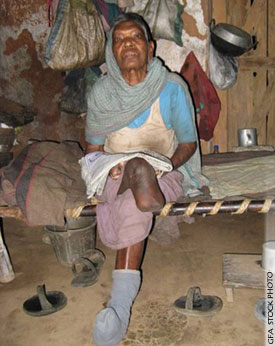
They live in a place where very few are willing to show them simple acts of love. Such is the life of leprosy patients of South Asia.
Gospel for Asia-supported missionary Surya Bandi recently led a women’s fellowship team into two leprosy colonies near his church. The pastor and the believers wanted to get to know the people and hear about their needs.
What they learned was staggering and hard to comprehend. There are about 42 families—roughly 2,500 people—who live in the two settlements.
The people came to the leprosy colonies from their homes, which are as far as 50 miles away. When their leprosy was diagnosed, they were kicked out of their family homes, fired from their jobs and sent away. Some of the people living in these squalid areas used to own property—a rare thing in South Asia—but it was taken from them upon their diagnosis. Others had good jobs—one man was a carpenter and another worked in an office. But all of that evaporated when they contracted leprosy.
They never receive visits from their families. Of those that have children, only a handful are able to see them. Most of their children go to school somewhere else or live with relatives.
Few people come to visit them—not even doctors come to offer any sort of treatment.
In one leprosy colony, 22 families share two toilets. The property they are illegally settled on belongs to the government, which could bulldoze down their little huts and force them to move without giving them notice. There is no furniture in their huts. There is no steady supply of water.
A few of the patients venture out to look for day labor jobs, while others are so physically impaired all they can do is beg for a few rupees to buy rice for a meal.
What Surya and the Women’s Fellowship team discovered that day was a place where people are in desperate need of medicine, proper shelter, food, clean water and the love of Jesus.
In the days to come, this missionary and the team of women will return to these humble homes. They will provide for the people’s needs by giving them food, clean clothing and household items. They will take care of their medical needs by bringing in trained personnel to treat these suffering men and women.
Most importantly, they will take time to love these people whom the rest of the world have rejected as unlovable. And these desperate people who are shunned in their society will get the chance to meet the Savior who accepts them just as they are.














































